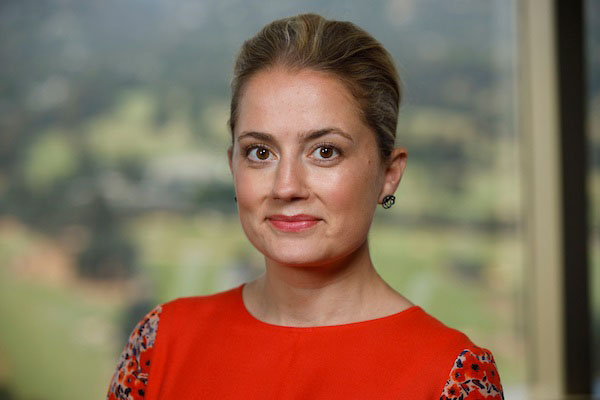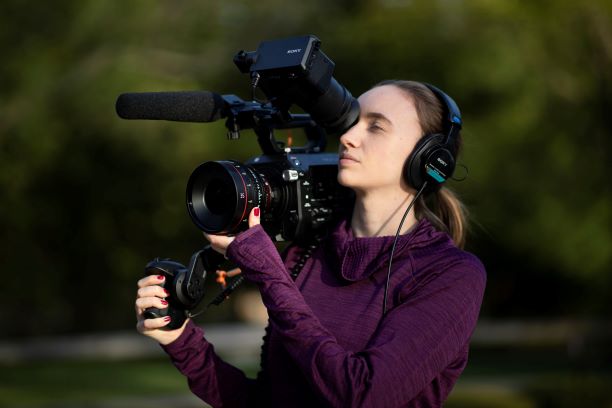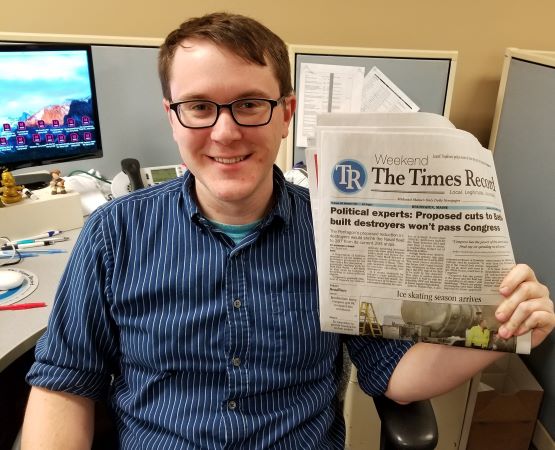“We like to say that behind every scholarship, there is a person, and Maddy Corson – and her family – are wonderful examples of people in Maine doing good for the people of Maine,” says Liz Fickett, scholarship funds manager who works with the Gannett committee. “Our Gannett scholars are forging new places for themselves across all forms of media, believing in the highest calling to tell the truth and bring the news to their communities.”
Four Gannett scholars from Maine share their views on journalism. Links to the full transcripts follow each interview below.
Levi Bridges
Freelance international audio reporter and podcast producer; bylines with National Public Radio, Public Radio International, “Marketplace”
Education: Master’s in journalism, University of California, Berkeley
How has Maine shaped your view of the world? As an independent foreign correspondent working in Mexico and Russia, I’m always amazed when I come back to Maine and how safe it feels here. I see myself trying to tell the stories of the vast majority of the world’s people who weren’t fortunate to grow up in a place like this. When you live in a state like Maine it’s really easy to lose yourself in the sense of peace – and in rural places in general – and forget what life is like for people in the rest of the world. When I’m writing and reporting stories, I have people who live in places like Maine in the back of my mind because those are the people I want to reach.
Why is journalism important today? How journalists can restore faith in the media and combat disinformation is going to be the most important question that we will have to answer during our careers in the coming decades.
At top: Levi Bridges interviews a Honduran migrant at a shelter in southern Mexico.

Esmé Deprez
Senior reporter, projects and investigations team, Bloomberg News and Bloomberg Businessweek
Education: Master’s in journalism, Columbia University
Most memorable assignment: As the presidential race heated up in the summer of 2016, my editor called me with what felt at first like an insane idea. Within weeks, I found myself aboard a Greyhound bus departing Philadelphia for Los Angeles with one goal: to take readers outside the Washington-New York bubble and introduce them to a slice of the electorate with whom they have little contact. Over 3,041 miles and 11 states, a photographer and I dug into the lives of more than 100 voters. We rode as many as seven hours a day and loitered in bus depots to gauge the mood of this mobile community. It wouldn’t be enough simply to meet people – we’d need to persuade them to share their most personal experiences, beliefs, and hopes while surrounded by strangers.
Ten teams throughout the newsroom collaborated on the project, Bloomberg’s first of this type. “Bus to November” gave readers special insight into an unsettled, angry electorate yearning to be heard. The value of mere conversation would prove prescient: As the horse race dominated coverage, it obscured the support that would propel Donald Trump to victory.

Hessert on the job as a cinematographer.
Dominique Hessert
Cinematographer on The New Yorker video team
Education: BFA in photojournalism, Rochester Institute of Technology
Why journalism? Growing up, I was painfully shy. Hiding behind a camera was my way to experience and observe my life, my friends, but mostly my big family. That blossomed into an intense passion for observational photography, which I identified as photojournalism.
When I got to college, I began to second-guess my photojournalism major and dabbled in advertising and fine art photography. To clear up my decision, I went on a photojournalism internship to Kenya and followed high school students working on an invention to eliminate deforestation and pollution that had harmed their villages. I spent the summer capturing the hours of work these kids put in just so their homes could survive. It became so natural to ask questions and engage with strangers, a skill that was once my biggest obstacle. I realized the impact of my Nairobi experience was something I wanted to share with others. That’s when the power of journalism became clear, and I never questioned my degree choice again.
Dominique Hessert full interview

McCrea at The Times Record in Brunswick.
Nick McCrea
Managing editor, The Times Record; previously Bangor Daily News reporter
Education: BA in journalism, University of Maine; master’s in journalism, Syracuse University
Most memorable assignment: I wanted to know what it was like to live on an isolated Maine island in the dead of winter. A photographer and I took the mail boat to Isle au Haut in the middle of January and spent the weekend with most of the dozen residents. I spoke to both students at the one-room schoolhouse about how they entertained themselves. I spoke with a man whose ancestors settled the island more than 200 years ago. More importantly, I talked to residents about their worries. The number of year-rounders is dwindling as more people move off island, putting the future of the entire community in question. It was a fun, gritty story with people, their relationships, and the hardships of remote life at its heart.
Advice to future Gannett scholars: Strive for the truth. Never stop learning, reading or asking difficult questions. Once you’ve asked those questions, push to find the answer – especially if it’s hidden.





